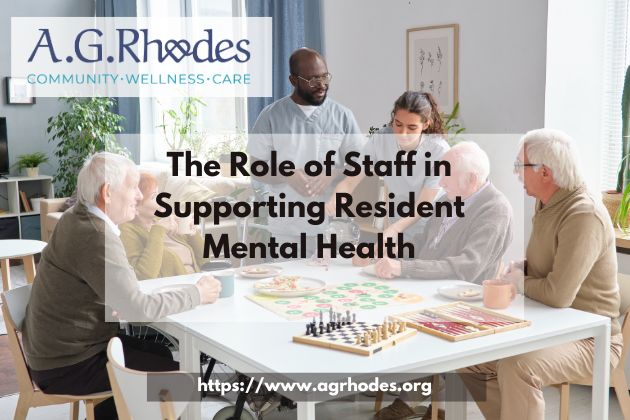 A.G. Rhodes has long emphasized the value of staff in fostering resident well-being. However, there is more to be said—and done—when it comes to equipping nursing home teams with actionable strategies to support mental health in a sustainable, compassionate, and impactful way.
A.G. Rhodes has long emphasized the value of staff in fostering resident well-being. However, there is more to be said—and done—when it comes to equipping nursing home teams with actionable strategies to support mental health in a sustainable, compassionate, and impactful way.
Why Mental Health in Nursing Homes Demands Staff Involvement
Mental health is not a luxury—it is a necessity, especially for seniors living in long-term care settings. As aging residents cope with cognitive decline, loneliness, grief, and chronic illness, staff play a frontline role in early detection, emotional support, and environmental regulation. Compassionate, trained, and proactive caregiving staff are the key to reducing depression, improving cognitive engagement, and enhancing overall quality of life.
Understanding the Emotional Landscape of Seniors in Long-Term Care
Many seniors enter nursing homes after profound life changes: the death of a spouse, the onset of disability, or being distanced from lifelong communities. These changes often contribute to:
- Depression and anxiety
- Cognitive disorders like dementia
- Social withdrawal
- Loss of autonomy
- Fear and confusion
Staff must recognize that mental health conditions in seniors can manifest subtly, such as changes in appetite, irregular sleep, agitation, or increased silence. Understanding these signs is vital for timely intervention.
The Direct Impact of Staff on Resident Mental Wellness
Every interaction between caregiver and resident is a chance to improve mental health outcomes. Here’s how staff support shapes emotional well-being:
1. Building Emotional Connections Through Presence and Routine
Consistency in caregiver assignments helps foster trust. When residents are supported by familiar faces, they are more likely to feel secure and understood. This familiarity:
- Reduces anxiety and confusion
- Encourages open communication
- Enhances trust in medical and daily care routines
2. Communication with Compassion
Empathetic communication is a cornerstone of mental wellness. Training staff to:
- Speak slowly and clearly
- Use positive, reassuring language
- Maintain eye contact and smile
- Listen actively without interrupting
3. Personalized Care Enhances Dignity and Joy
A personalized approach—remembering a resident’s favorite food, hobby, or story—elevates daily care from routine to relational. This nurtures:
- A sense of identity
- Joy in small moments
- Validation of personal worth
Actionable Strategies for Caregivers Supporting Senior Mental Health
Care teams need not be mental health professionals to make a significant difference. Implementing the following research-backed strategies can yield measurable improvements in resident well-being:
1. Promote Social Engagement Opportunities
- Encourage participation in group activities
- Host themed events that include music, dance, or storytelling
- Facilitate family visits through video calls or safe in-person formats
- Pair residents with “activity buddies” to reduce isolation
2. Integrate Mental Health Check-Ins into Daily Routines
Caregivers should routinely ask:
- “How are you feeling today?”
- “Is there anything worrying you?”
- “Would you like to talk about anything?”
These conversations build trust and normalize mental health dialogue.
3. Collaborate with On-Site Therapists and Specialists
When staff observe signs of emotional distress, they should refer residents to be evaluated by specialists like those below to ensure residents receive timely, specialized care:
- Licensed clinical social workers
- Geriatric psychologists
- Occupational therapists with cognitive training
4. Offer Mindfulness and Stress Reduction Sessions
Help residents feel calmer and more in control with simple practices like:
- Breathing exercises
- Gentle stretching or yoga
- Quiet reflection or guided meditation
5. Recognize and Celebrate Milestones
Whether it’s a birthday, personal achievement, or a good day health-wise, you can reinforce positive emotions and community bonding by celebrating with:
- Cards
- Decorations
- Small gifts
- Shared meals
Training Staff: The Foundation of a Mentally Healthy Facility
Investing in ongoing training ensures staff are equipped to support both clinical and emotional needs. Focus areas should include:
- Mental health first aid for seniors
- De-escalation techniques for agitated residents
- Trauma-informed care
- Cultural sensitivity and inclusivity
- Burnout prevention and self-care for staff
Facilities that prioritize staff education inevitably create healthier environments for residents.
Preventing Staff Burnout to Protect Resident Well-being
When staff are overstretched or emotionally exhausted, the quality of care—and the mental health of residents—declines. Effective nursing homes must:
- Offer mental health support for caregivers
- Implement manageable caregiver-to-resident ratios
- Encourage team debriefings and peer support systems
- Recognize and reward excellent care performance
Leadership’s Role in Shaping a Culture of Mental Wellness
Administrators and nursing directors must lead by example by:
- Prioritizing mental health protocols in staff orientation
- Enforcing anti-bullying and anti-isolation policies
- Scheduling regular mental health evaluations for residents
- Creating open-door policies for staff and residents to voice concerns
An empowered team leads to residents who feel safe, valued, and emotionally supported.
Conclusion: Compassionate Staff Make the Difference
At the core of every thriving nursing home is a team of caregivers who understand that mental health care is not optional—it is essential. When staff are well-trained, well-supported, and emotionally engaged, residents thrive not only physically but emotionally and spiritually.
Let us champion the caregivers who show up daily with patience, kindness, and empathy—they are the frontlines of mental wellness in long-term care.
At A.G. Rhodes, residents deserve caregivers who are not only trained in physical care but also empowered to elevate mental and emotional well-being. If you’re looking for a care environment that prioritizes total wellness—mental, emotional, and physical—reach out today to learn how A.G. Rhodes is redefining what it means to care.

